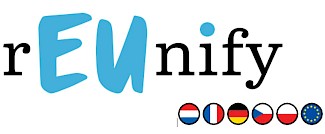The reunification of Germany has been a key event in recent European history. It is also a turning point in the construction of the European Union and democratic transition in Central-Eastern Europe. German unity may seem obvious today – especially for young generations – but in 1990, the prospect of a reunification between East and West Germany aroused strong reactions from its neighbours. The difficult historical relations of Germany with these countries have, of course, played a role in this. As such in 1990, German reunification presented an immense challenge for the entire European continent: While Germany was preoccupied with its national reconstruction, its neighbours to the east were embarking on their own democratic and economic transformation.
The rEUnify project puts into practice the exchange on the current significance of German reunification in European neighbouring countries such as the Netherlands, Poland, France and Czech Republic. The debate is being held in several public events in all countries of the participating institutions and will include historical witnesses, local citizens and students in the discussion.
The different national perspectives will be collected in an academic report, published by the political news magazine “New Eastern Europe”.
All project results and information are also available on the website of the project partner College of Eastern Europe Wroclaw (KEW): Project site KEW

Team
 Share project
Share project




















